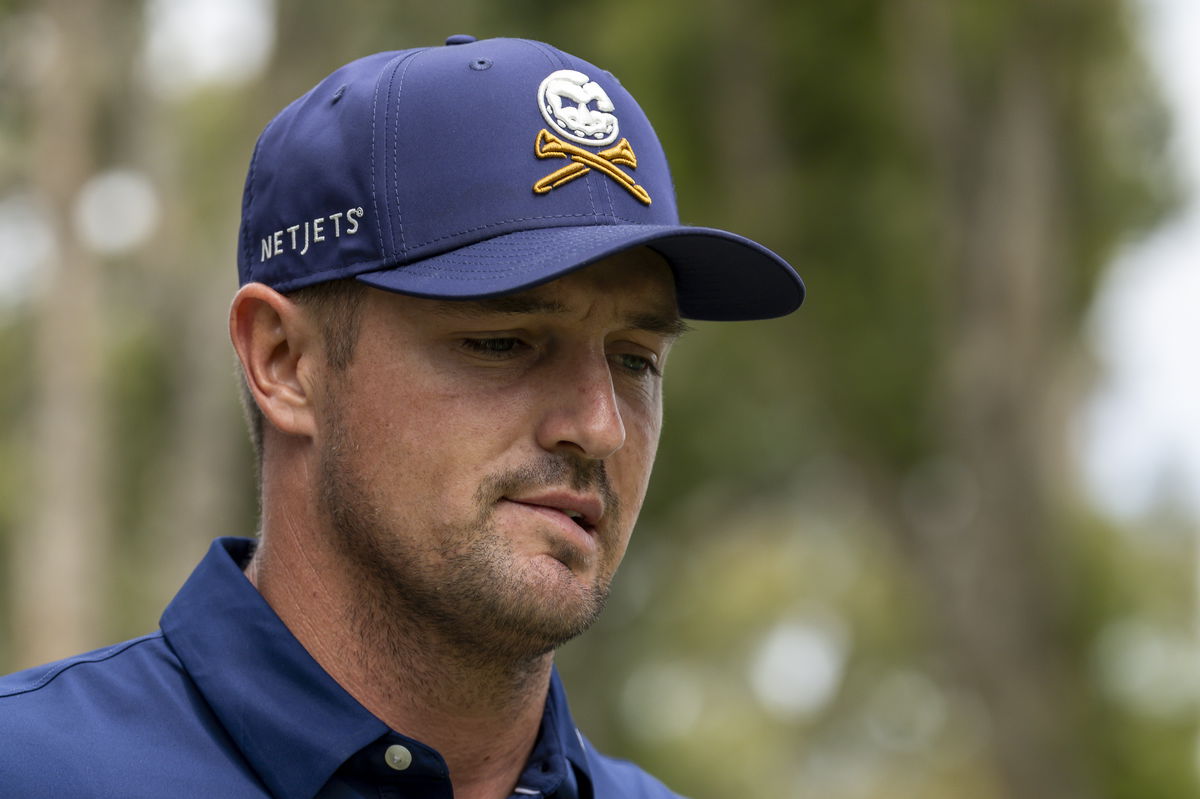
Getty
HONG KONG, CHINA – MARCH 9: Bryson DeChambeau of United States reacts on day three final round of LIV Golf Hong Kong at The Hong Kong Golf Club on March 9, 2025 in Hong Kong, China. (Photo by Yu Chun Christopher Wong/Eurasia Sport Images/Getty Images)

Getty
HONG KONG, CHINA – MARCH 9: Bryson DeChambeau of United States reacts on day three final round of LIV Golf Hong Kong at The Hong Kong Golf Club on March 9, 2025 in Hong Kong, China. (Photo by Yu Chun Christopher Wong/Eurasia Sport Images/Getty Images)
The man who revolutionized golf with science and data just delivered one of the most scientifically inexplicable performances in major championship history. Bryson DeChambeau stood alone atop the PGA Championship leaderboard Saturday afternoon. He’d played flawlessly through 15 holes at Quail Hollow. Then came the notorious “Green Mile,” and golf’s mad scientist watched his championship dreams evaporate.
Watch What’s Trending Now!
DeChambeau entered the 16th hole at 8-under par. He held a commanding lead over the field. First, a bogey on 16 cracked the foundation. Then came the catastrophe on 17. “I hit a great 9-iron exactly the way I wanted to,” DeChambeau explained afterward. “The wind just pumped it. Nothing I can do.” Critics weren’t buying the explanation. The No Laying Up podcast hosts dissected his performance mercilessly.
“196 yards was the yardage, but it landed 172 into the water,” they noted. “That’s just inexcusable if you want to win major championships.” The distance miscalculation exposed his equipment philosophy’s fundamental flaw. DeChambeau’s Avoda Prototype single-length irons all measure 37.5 inches uniformly.
“How do you divide up five clubs over that big of a distance?” the podcast hosts wondered. Traditional players have a natural progression in their iron distances. DeChambeau carries two Krank drivers for maximum flexibility off the tee. Yet he struggles with basic iron distance control when precision matters most. His nine-iron normally carries 190 yards under calm conditions. The wind shifted from neutral to directly opposing, completely catching him off guard.

Imago
PGA, Golf Herren PGA Championship – Third Round May 20, 2023 Rochester, New York, USA Bryson DeChambeau reacts to a putt on the ninth green during the third round of the PGA Championship golf tournament. Rochester Oak Hill Country Club New York USA, EDITORIAL USE ONLY PUBLICATIONxINxGERxSUIxAUTxONLY Copyright: xAaronxDosterx 20230520_anw_db4_520| Credits: Imago
The double-bogey sent DeChambeau spiraling down the leaderboard. Meanwhile, Scottie Scheffler seized the moment with traditional equipment. Scheffler played the final five holes in 5-under par. His standard-length irons provided predictable yardages throughout.
DeChambeau’s final round dropped him to eighth place. He finished six shots behind Scheffler. “His irons are all messed up,” the podcast noted bluntly. The scientific approach had failed spectacularly again.
This equipment-related collapse reveals a troubling pattern that extends far beyond Saturday’s disappointment at Quail Hollow.
The Masters Parallel: Science Failing When It Matters Most
DeChambeau’s PGA struggles mirror his recent Masters heartbreak perfectly. He entered Sunday’s final round just two shots behind Rory McIlroy and briefly tied for the lead after birdieing the par-5 second hole. However, the wheels came off quickly at Augusta National, starting with a three-putt bogey on the third hole that permanently handed McIlroy the advantage.
Despite averaging 316 yards off the tee, his iron play deteriorated dramatically throughout the final round, managing only 63.9% greens in regulation. The 12th hole delivered the decisive blow when his tee shot found Rae’s Creek for a crushing double-bogey, followed by another bogey at the 17th.
His final-round 75 was devastating for someone preaching scientific perfection, as he finished tied for fifth, six shots behind winner McIlroy. The pattern reveals itself clearly through tournament statistics—DeChambeau reached the weekend in both majors with realistic winning chances, yet posted rounds of 75 at both Augusta and Quail Hollow. At the same time, traditional contenders like Scheffler and McIlroy closed with rounds in the 60s. The harsh truth: DeChambeau has converted just two major championships from 11 top-10 finishes since 2022, a meager 18% closing rate that suggests a fundamental flaw in his approach to Sunday pressure.
McIlroy handled the final-round pressure with remarkable composure, proving his traditional preparation and mental approach superior when the championship hung in the balance. DeChambeau’s scientific methodology promises optimal performance through data analysis, yet major championships repeatedly expose the limitations of overthinking golf.
His analytical approach works brilliantly in regular tour events, but the unique pressure of major Sundays overwhelms his systematic processes. Looking ahead, DeChambeau must address these psychological barriers—his physical tools give him chances consistently. Still, science has yet to conquer the art of Sunday pressure in golf’s most significant moments.







